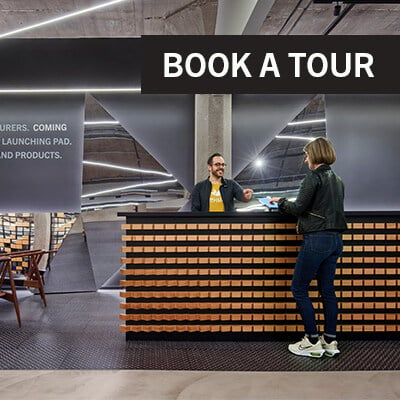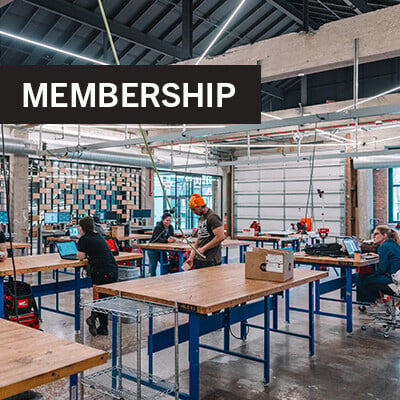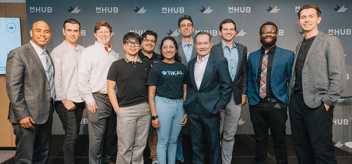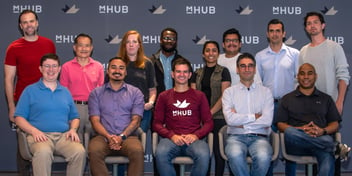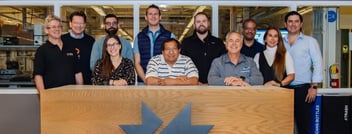Meet the 10 startups currently participating in the mHUB 2024 Climate and EnergyTech Accelerator. These diverse startup teams began their 6-month hands-on experience in October of 2023 and have worked through intensive programming, participated in workshops, and engaged with mentors as well as the program's industry partners Invenergy and Constellation Energy. These cleantech startups are gearing up for their grand finale showcase at Demo Day on April 11, 2024.
This cohort of climate tech and energy tech startups is driving the commercialization of disruptive hardtech solutions, including devices for energy storage, carbon capture and utilization, renewable energy, and advanced materials, among other things. Click on the links below to jump to the company featurette you want to read through (it's recommended you read about ALL these spectacular startups).
Aeternal Upcycling
CarbonSeaQuest
CryoCellar
Farm to Flame Energy
FurnaQuantum
Metasorbex
Next-Ion
Rushnu
Sensatek
Tikal Industries
Aeternal Upcycling
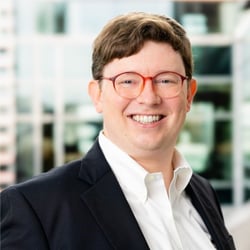 Startup co-founders Robert Kennedy and Ryan Hackler were postdocs at Argonne National Laboratory, in The Institute for Cooperative Upcycling of Plastics. Ryan and Robert invented a catalyst that can turn plastic waste into waxes and lubricants, which is “a significant value-add for plastics that would otherwise end up in a landfill,” explains Kennedy. “We're currently working to scale up the technology and develop new products. Our technology has the potential to divert millions of tons of plastic waste away from landfilling and incineration and back into the carbon economy. We would also be preventing millions of tons of CO2 from entering the atmosphere because our process is more efficient than drilling and refining crude oil.”
Startup co-founders Robert Kennedy and Ryan Hackler were postdocs at Argonne National Laboratory, in The Institute for Cooperative Upcycling of Plastics. Ryan and Robert invented a catalyst that can turn plastic waste into waxes and lubricants, which is “a significant value-add for plastics that would otherwise end up in a landfill,” explains Kennedy. “We're currently working to scale up the technology and develop new products. Our technology has the potential to divert millions of tons of plastic waste away from landfilling and incineration and back into the carbon economy. We would also be preventing millions of tons of CO2 from entering the atmosphere because our process is more efficient than drilling and refining crude oil.”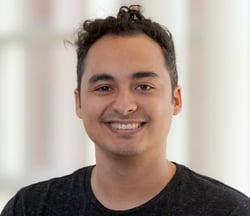 “Chemical technologies are very capital-intensive,” adds Hackler. “You need to put steel in the ground, and customers buy products by the ton. We need to prove this technology is rock-solid and that we can provide the performance Aeternal Upcycling’s customers need every day. The support of mHUB and Chain Reaction Innovations is key for our plans to de-risk this technology on a small scale, so we can prove we're ready to go big.”
“Chemical technologies are very capital-intensive,” adds Hackler. “You need to put steel in the ground, and customers buy products by the ton. We need to prove this technology is rock-solid and that we can provide the performance Aeternal Upcycling’s customers need every day. The support of mHUB and Chain Reaction Innovations is key for our plans to de-risk this technology on a small scale, so we can prove we're ready to go big.”
“When we started, we were making a teaspoon of wax - just enough to say we did it, and that felt very exciting at the time,” continues Kennedy. “Now we're able to make a lot more. We're setting things up right now so we can start producing a kilogram of wax at a time. At that scale, we'll make demo products, showing how customers could swap in our new chemicals. mHUB supports us in so many ways. We are especially appreciative of the peers that mHUB brought together within the 2024 accelerator cohort and the mentors with whom we've partnered.”
“We're planning to grow to the next stage this year,” shares Hackler. “It's all about developing products, building partnerships, and starting pilots to keep us on the road to commercialization. We're trying to maintain a balance of customer discovery, acquiring new funding, and tech development to keep the gears turning.”
Aeternal Upcycling is selected to receive a Clean Energy Tech voucher through the U.S. DOE and RTI International to analyze market opportunities and competitive landscapes for their plastic upcycling technology. This is in addition to being selected for a $1.5M Pilot Plant Demonstration from the U.S. DOE's REMADE Institute. Aeternal Upcycling also received a 2023 Multicultural Innovator Award from Nicor Gas.
Learn more about Aeternal Upcycling.
Carbon Seaquest
“As a native of a city plagued by severe air quality issues stemming from crude oil exploration and refinery emissions, I felt a profound urge to address this pressing environmental challenge,” shares Chisom Emegoakor, CEO and Founder of Carbon SeaQuest. Recognizing carbon capture utilization and storage (CCUS) as the most economically viable solution for hard-to-abate sectors, I embarked on a quest to develop a cutting-edge, platform-agnostic carbon capture system with Carbon SeaQuest. Carbon SeaQuest's initial focus is on revolutionizing the maritime industry by offering a compact, lightweight, high-efficiency solution.”
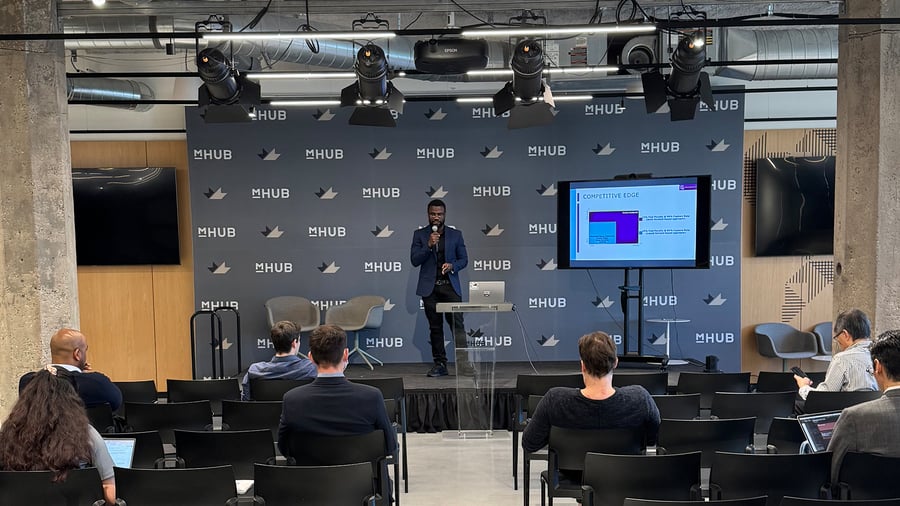
“Our technology targets sectors responsible for emitting over 20 gigatons of CO2 annually, including maritime, power plants, and industrial domains. By providing an efficient and scalable carbon capture solution, we aim to significantly reduce global carbon emissions, mitigating the adverse effects of climate change and fostering sustainable practices.”
“In the realm of onboard carbon capture, establishing robust transportation and storage infrastructure around key port locations remains paramount. We are actively collaborating with partners to ensure seamless CO2 delivery to sustainable utilizers or sequestration sites. Despite challenges, the maritime sector presents promising opportunities, with advancements such as LCO2 ships and port-based CO2 storage systems facilitating the transportation of captured CO2.”
“Since our inception, we have successfully onboarded ship owners as our esteemed customers and commenced the development of our prototype at mHUB. We have secured several patents safeguarding our innovative carbon capture systems, underscoring our commitment to technological advancement and intellectual property protection."
"Carbon Seaquest’s journey with mHUB has been exceptionally rewarding, facilitating invaluable connections with investors, partners, and customers. The hardware team's expertise has been instrumental in refining our prototype, accelerating our path-to-market readiness. For any deep-tech startup seeking comprehensive support to build or refine their prototype, mHUB's accelerator program offers unparalleled opportunities for growth and development.”
Learn more about Carbon SeaQuest.
CryoCellar
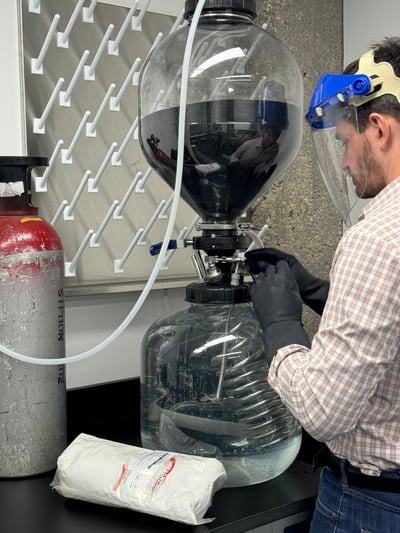 “I got the idea for Cryocellar through a pretty original founder's journey,” explains startup founder Jordan DeVries.
“I got the idea for Cryocellar through a pretty original founder's journey,” explains startup founder Jordan DeVries.
“Originally starting as a means to provide in-field produce pre-cooling through dry ice, I pivoted to what to do with the CO2 after the dry ice sublimates,” continues DeVries. “After talking to many CO2 direct air capture companies, it became apparent that they didn't have an immediate plan for what to do with their captured CO2.”
“Many greenhouse operators didn't want it because it had too much bromine gas, and pressurizing it to store in cylinders was cost prohibitive. One solution for CO2 storage is to convert it into rocks in a process called geochemical mineralization. Luckily, underneath the Great Lakes there is an abundant source of the alkaline minerals needed for this process.”
"My hope is that this technology has a big impact for making small family farms more profitable in America and helping smallholder farmers feed their communities across the developing world. Farming profits are growing slimmer every year. This CO2 storage technology adds profits from carbon removal credits to offset growing costs, or future impacts from climate change, while creating a soil amendment that improves soil moisture retention and root growth.”
“The biggest thing I have gained from mHUB is collaboration with other founders. I'm testing an idea right now that may allow me to work with Rise Gardens, with help from another mHUB portfolio company, Tikal Industries.”
Learn more about Cryocellar.
Farm to Flame Energy
The startup, born in 2018 in Pittsburgh, has devised an innovative way to reduce energy costs for manufacturers by transforming biomass waste into clean energy, leveraging biomass waste as fuel.
“We want to install 100-megawatts of capacity in the next 5 years, enabling upwards of 1 million people to gain access to electricity,” explains Farm to Flame Energy co-founder and chief commercial officer, Stefano Alva. “As we navigate the path to commercialization, we are leveraging mHUB to build relationships with organizations that can procure our services. We’ve raised $625K since joining the mHUB Accelerator. FTF Energy raised $2M in capital and secured partnerships with multinational companies like Georgia Pacific."
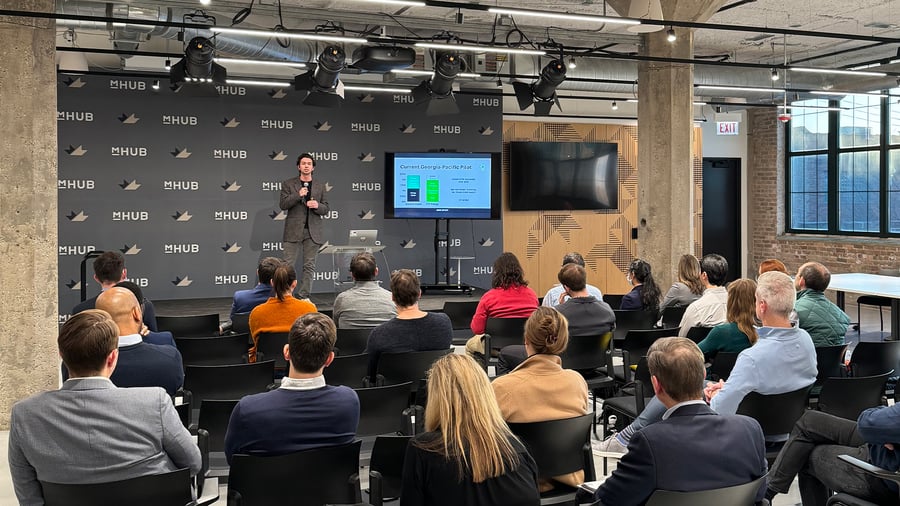
In November 2023, Farm to Flame Energy won the 2023 UpPrize: Social Innovation Challenge and took home the $150,000 Grand Prize & Sustainability award for providing renewable, on-demand power and heading to industrial facilities using biomass waste as fuel.
Learn more about Farm to Flame Energy.
FurnaQuantum
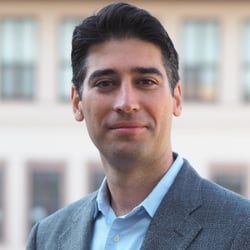 “FurnaQuantum introduces a next-generation wafer manufacturing technology aimed at accelerating Silicon Carbide (SiC) production through its Quantum Phonon Aggregation technology,” explains startup founder Onur Ergen. “The idea for FurnaQuantum originated from a December 2021 news article highlighting the significant SiC shortage in the automotive industry; projecting a $210 billion USD loss for the sector. Addressing this shortage for the Electric Vehicle (EV) industry, FurnaQuantum's advanced furnace promises unparalleled efficiency in creating defect-free SiC wafers.”
“FurnaQuantum introduces a next-generation wafer manufacturing technology aimed at accelerating Silicon Carbide (SiC) production through its Quantum Phonon Aggregation technology,” explains startup founder Onur Ergen. “The idea for FurnaQuantum originated from a December 2021 news article highlighting the significant SiC shortage in the automotive industry; projecting a $210 billion USD loss for the sector. Addressing this shortage for the Electric Vehicle (EV) industry, FurnaQuantum's advanced furnace promises unparalleled efficiency in creating defect-free SiC wafers.”
“At its essence, the technology orchestrates the regulation of quantum-level phonon aggregation thus minimizing defective energy formation. FurnaQuantum enhances production capabilities by 2-3 times, providing a much cleaner and more controllable process. Additionally, it can produce large-scale SiC wafers up to 8 inches, with the technology promising up to 12-inch diameter wafers for SiC. FurnaQuantum wafers will significantly reduce the economic and environmental burden currently experienced due to the use of traditional SiC semiconductor wafers.”
“FurnaQuantum is currently in the process of building our initial large prototype furnace and producing SiC ingot wafers. Connections, insight, and great mentorship is what we’ve gained through the mHUB Accelerator. mHUB has integrated us into its ecosystem much faster than any other accelerator could have. It has given us confidence in the value of our work and made us feel supported and not alone.”
Learn more about FurnaQuantum.
Metasorbex
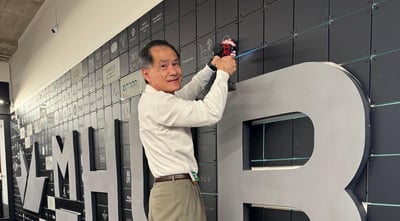 “Our goal is to reduce carbon capture costs by 10x for challenging sectors responsible for 60% of global CO2 emissions; such as power, transportation, chemicals, cement, iron and steel,” explains Edward Chan, founder and CEO of Metasorbex Corporation. “We achieve this through innovative nanocarbons that enable more efficient CO2 adsorption and regeneration with lower energy consumption than current technologies. The environmental impact is 1.5 billion tons per year of carbon emissions reduction and 0.5 billion tons per year of avoidance in petroleum mining.”
“Our goal is to reduce carbon capture costs by 10x for challenging sectors responsible for 60% of global CO2 emissions; such as power, transportation, chemicals, cement, iron and steel,” explains Edward Chan, founder and CEO of Metasorbex Corporation. “We achieve this through innovative nanocarbons that enable more efficient CO2 adsorption and regeneration with lower energy consumption than current technologies. The environmental impact is 1.5 billion tons per year of carbon emissions reduction and 0.5 billion tons per year of avoidance in petroleum mining.”
“While working through the mHUB Accelerator, Metasorbex has accomplished much since October 2023,” continues Chan. “We hired a chemical veteran as vice president of business development, and we designed a carbon capture prototype out of off-the-shelf equipment. Three financial scenarios were created for methanol and hydrogen as a benefit for carbon capture utilization. Metasorbex is in discussions with three potential paid trials. We also started a podcast and blog to contribute our thought leadership in carbon capture utilization.”
“My advice to founders is to stay curious, learn the subject deeply, and find the real pain points of your customer.”
Learn more about Metasorbex.
Next-Ion
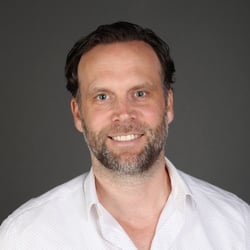 “Our batteries charge electric vehicles in 6 minutes and they don't explode,” states startup founder Kevin Jones.
“Our batteries charge electric vehicles in 6 minutes and they don't explode,” states startup founder Kevin Jones.
“To make your cell phone transmit further or make your laptop battery last longer, Next-Ion developed a non-exploding battery and high-temperature operation battery to improve electronics’ performance (watch the demo),” continues Jones.
“We make aerogel, and we take the aerogel to make a thermal paste from it, and we also make a battery separator. Separators are responsible for battery safety. This video demonstrates shrinkage of commercial separators as opposed to Next-Ion’s separator.”
The idea for Next-Ion was born in March 2019 in the Berkeley Physics Lab, and the startup was accepted into the mHUB Accelerator’s 2024 Climate and EnergyTech cohort. “Through the mHUB Accelerator, Next-Ion has met great people. We have won a government grant and have customer pilots,” shares Jones.
Next-Ion sees lots of opportunity in the EV sector as well as in helping GPUs operate faster. When asked to share his advice with startup founders, Jones says: “Don't hand-wave. Be direct. You can't be everything. Always close a deal.”
Learn more about Next-Ion.
Rushnu
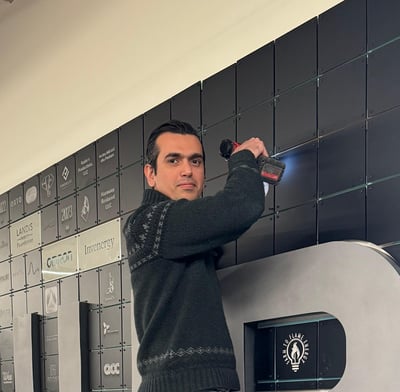 "It was through my Masters program and PhD thesis that I developed bio-based processes for CO2 capture and conversion to value-added chemicals," explains Dr. Matin Hanifzadeh, Ph.D. "Less than 1% of industrial CO2 is being captured per year. There are three main challenges with traditional carbon capture and storage (CCS) that our startup, Rushnu, has been working to address: high cost, lack of revenue streams, and storage complexities."
"It was through my Masters program and PhD thesis that I developed bio-based processes for CO2 capture and conversion to value-added chemicals," explains Dr. Matin Hanifzadeh, Ph.D. "Less than 1% of industrial CO2 is being captured per year. There are three main challenges with traditional carbon capture and storage (CCS) that our startup, Rushnu, has been working to address: high cost, lack of revenue streams, and storage complexities."
"Rushnu's solution involves creating carbon capture units that will capture 125,000 tons of CO2 annually. Rushnu's technology inputs CO2 from dilute emission sources, rapidly mineralizes the CO2, and concurrently generates valuable by-product chemicals. The chemical by-products can either be used directly by emitters as feed stock or sold to generate a profit. Because the CO2 is mineralized, essentially producing a rock, the CO2 is prevented from entering the atmosphere and this eliminates the need for geological reservoirs or CO2 pipelines. Compared to other companies that mineralize captured carbon, Rushnu's process uses less than a third of the energy of competitors, which significantly decreases the carbon penalty and the capital/operating costs of the process.
"We currently have two signed LOIs for commercial pilots. We've filed the PCT application for international protection centered on our unique solvent regeneration process, which is crucial to reducing energy usage."
Learn more about Rushnu.
Sensatek
“While pursuing a Masters of Science in Aeronautics at Embry-Riddle Aeronautical University, I was conducting research in the gas turbine engine laboratory, discovering first-hand how parts fail when operating at high stress,” explains Reamonn Soto, CEO of Sensatek Propulsion Technology, Inc. “For my thesis, I investigated the issue more broadly with the intent of discovering a solution to the problem. As a student, I began reaching out to gas turbine manufacturers at GE, Siemens Energy, and NextEra Energy Resources Florida Power and Light to better understand how engines were being used in aerospace and power generation.”
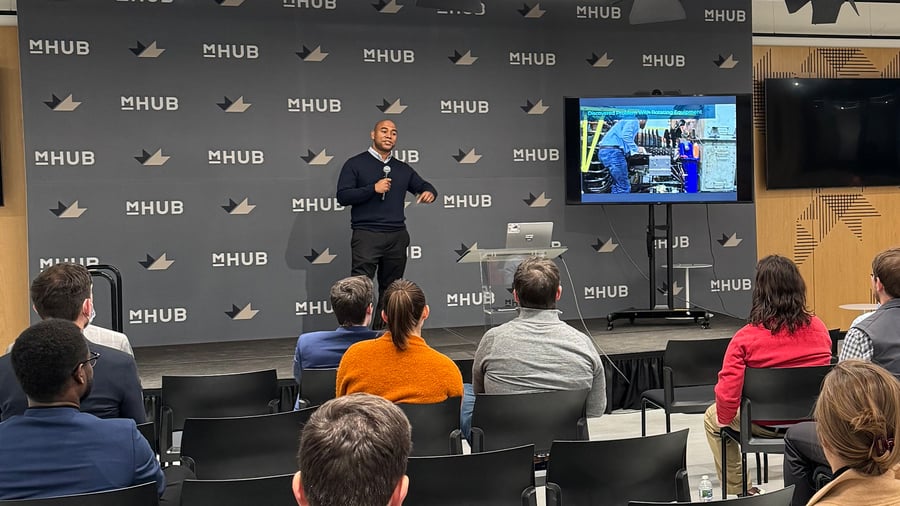
“I learned that while wind turbines are viable options for replacing natural-gas-burning turbine engines, operations and maintenance costs can render wind projects non-profitable because of the increase in levelized cost of energy. For example, catastrophic wind turbine blade failures are costing $1.5 billion a year to fleet owners and operators across 700,000 blades in operation globally, and safety incidents have increased by more than 20% on wind farms.”
"Sensatek was formed to license and commercialize the technology into the wind turbine market to help make wind projects more profitable by reducing 20% of operations and maintenance costs and increasing annual energy production (AEP) by 3% from increased uptime of 120 days. By doing this, we increase the affordability and accessibility of renewable energy by reducing the levelized cost of energy for wind turbines, making wind energy more competitive compared to fossil fuels.”
"Milestones that Sensatek has achieved in the wind industry include completing the NextEra Energy Resources Florida Power and Light Accelerator with an opportunity for the technology to be adopted into a wind turbine fleet of 13,000 wind turbines when technical milestones have been achieved. Through the mHUB Climate and EnergyTech Accelerator, we are working with corporate partners Constellation Energy and Invenergy, who are large wind turbine owners/developers/operators, and we are progressing towards piloting the technology with wind fleet owners that include Siemens Gamesa, Shell, EDF Renewables, and PivotGen.”
“Through our experience in the mHUB Accelerator, we have gained insight into what it takes to be successful as entrepreneurs; from conducting early-stage sales to deepening the understanding of our business's financial model. We are focusing on building and offering our minimum viable product to wind turbine early-adopters with a track record of piloting new technologies. We will focus on our core value proposition of lowering the levelized cost of energy in wind turbines by minimizing downtime and improving uptime by monitoring how blade damage progresses so that owners and operators don’t have to guess how blade damage is progressing or shutdown the turbine to inspect each blade.”
Learn more about Sensatek.
Tikal Industries
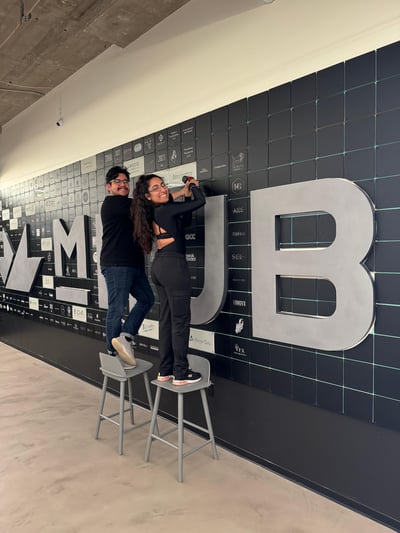 ”At Tikal, we believe in incentivizing industries to prioritize responsible water usage,” declares Tayyaba Ali, Co-Founder and CEO of Tikal Industries. “By partnering with "brown" industries and providing them with solutions that not only mitigate pollution but also optimize their water usage, we aim to create a symbiotic relationship between industry and the environment. Our vision extends beyond mere mitigation; we aspire to lead the way in the era of water-energy nexus optimization. By harnessing the power of data and technology, we are committed to unlocking the full closed-loop potential of water within manufacturing and energy generation.”
”At Tikal, we believe in incentivizing industries to prioritize responsible water usage,” declares Tayyaba Ali, Co-Founder and CEO of Tikal Industries. “By partnering with "brown" industries and providing them with solutions that not only mitigate pollution but also optimize their water usage, we aim to create a symbiotic relationship between industry and the environment. Our vision extends beyond mere mitigation; we aspire to lead the way in the era of water-energy nexus optimization. By harnessing the power of data and technology, we are committed to unlocking the full closed-loop potential of water within manufacturing and energy generation.”
“Our technology at Tikal holds the promise of transformative impact on a global scale, specifically around how industry views water,” explains Christian Guerrero, CTO at Tikal. “By providing smart water management solutions tailored specifically for energy and heavy industries, Tikal is poised to revolutionize how these sectors approach water usage, supply chain management, and carbon reduction efforts - specifically by establishing a concrete relationship between water and GHG emissions. By utilizing Internet of Things (IoT) sensors, plants have unprecedented visibility into water usage patterns and quality metrics, empowering industries to make data-driven decisions that optimize water usage and minimize waste. This not only enhances operational efficiency but also contributes to significant cost savings and resource conservation.”
"mHUB has been our home-base since this company started back in 2022," continues Ali. "It is where we, the founders, met and grew the team, where we do all our R&D. Since our acceptance into the mHUB Accelerator, our integration into the facility’s ecosystem has skyrocketed. We have gained so much insight from the Experts-in-Residence, guest speakers, corporate partners, and mHUB’s leadership. We credit mHUB for our development as founders and developing a revenue-focused company that can withstand unforeseen ups and downs."
Tikal Industries was written into another organization's proposal, Current's Great Lakes ReNEW proposal in August 2023, and in January 2024, Current and Great Lakes ReNEW was awarded a $15 Million (and up to $160 million) Regional Innovation Engine Award from the National Science Foundation (NSF).
Learn more about Tikal Industries.
